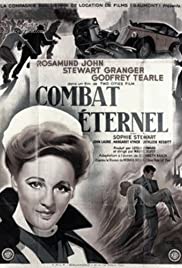
THE LAMP STILL BURNS
UK, 1943, 86 minutes, Black-and-white.
Rosamund John, Stewart Granger, Godfrey Tearle, John Laurie, Sophia Stewart, Cathleen Nesbitt, Margaret Viyer, Joan Maude, Leslie Dwyer, Wylie Watson, Joyce Grenfell, Ernest Thesiger, Megs Jenkins.
Directed by Maurice Elvey.
The Lamp Still Burns is a wartime propaganda film, a morale booster, focusing on the work of nurses, their dedication and their skills. There is also a critique of the severity of the discipline required in the hospital’s, rules and regulations, the strict interpretation of discipline by matrons and sisters, not treating the nurses as adults.
The film was produced by Leslie Howard, who produced a number of war propaganda films as well as appearing in them before his untimely death in a plane crash.
Rosamund John is always a serious actress in British films, here an architect to please her father but who wanted to be a nurse. She gets the opportunity, is recommended by a well-renowned doctor, is accepted, does well but has to learn a lot of the regulations through her mistakes. She makes friends with the other nurses, is praised by the superiors but never to her face.
As an architect, at the beginning of the film, she was in consultation with Stewart Granger who is later injured in an explosion at a factory and she has to care for him in the ward. He is attracted to her, she to him, but also finds him somewhat abrasive. There are complications with this romantic subplot because of an arrangement with a violinist – who is also involved in the accident, her hands being injured.
There is quite a lot of detail of hospital life which makes for interesting comparisons with contemporary nursing, similarities, development throughout the rest of the 20th century, improvements in regulations, in equipment and methods. There is an extensive scene of surgery.
There are interesting supporting character actors including a comic Leslie Dwyer, Joyce Grenfell as a doctor almost unrecognisable in comparison with her later comic roles, John Laurie is at his most genial as a surgeon.
The film works quite well in itself, a film of its period, a film with worthy intentions.
1. A drama of 1943? Britain? The experience of the war? Nurses and hospitals? Bombing raids?
2. The patriotic film, worktime propaganda? Produced by Leslie Howard?
3. The London setting, offices and business, architect world, the building of a hospital ward? Factories? The hospital, the wards, the nurses’ quarters, the dining room, surgeries? The musical score?
4. Hillary and her story, her visit to Rains, her design, his being busy, the phone call from Pam and her photo, her feeling put off? The consultation with the doctor, the assistant and his being knocked down by the taxi, going to the hospital, being impressed by the hospital?
5. Her not wanting architect, talking with the doctor, his supporting her, her being accepted, her desire to be a nurse?
6. The film’s portrait of the training of the nurses, the details of their training, the lectures, going up through the ranks? The picture of the strictness, the rules and regulations, cuffs on and off, not entering rooms without permission, standing when answering questions, hierarchical titles, the emphasis on discipline?
7. Hillary, interpreting the rules, making mistakes, interactions with the superior nurses, with the matron? Her exasperation yet determination to be a nurse?
8. Her friendship among the nurses, especially with Christine, their discussions, Christine eventually leaving to marry?
9. Going to the severe ward, the sister in charge, the patients, especially the diabetic and the soldier who had been in every hospital (except maternity)?
10. Hillary, her work, the makings of a nurse, her being sent to surgery and her helping? At the factory, the explosion, the work with George? Rains and Pamela and the injury? Hillary’s attraction to Rains? He to her?
11. Hilary looking after Rains in hospital, his talk, the attraction? The meeting with Pamela? Pamela and her violinist talent, her hands? Hilary talking to Rains, reminding him of Pamela, getting him to write the note, the bringing it to the ward, Pamela reading it, Hilary being reprimanded for carrying the note as well as going to different ward?
12. The experience of the air raids? The diabetic and his deliberately getting the wrong meal? The soldier, his story of hospitals?
13. Matron, past, belief in discipline, discussions with the doctors, reprimanding Hillary many times, the episode of the drinking beer?
14. Mr Hervey, in the surgery, on the rounds, friendly with the nurses, the discussions with matron? Dressing as Santa Claus, with the gifts, doing the rounds with Hilary?
15. Rains, his recovery, leaving hospital? His going to the board meeting, his generous donation, his questioning of the members of the board? The hospital depending on volunteers, donations? Equipment for the patients prior to anything for the nurses? Hilary being called in, her spirited speech about narrowminded discipline, nurses not treated as adults, yet her determination to stay because she wanted to be a nurse?
16. Rains, the discussion with Pamela, his proposing, her refusing, her urging him to go to Hilary? Their discussion, his proposal, her determination to be a nurse?
17. The final discussion with the matron, her being allowed to continue, doing well in exams, meeting with Rains, his being prepared to wait, are going to her work?